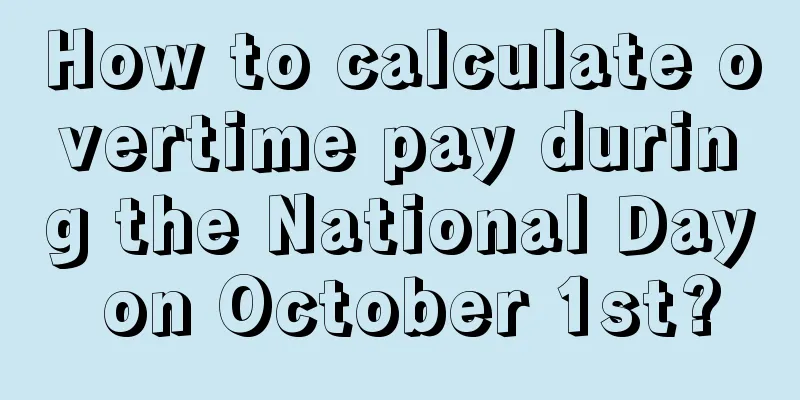How to calculate overtime pay during the National Day on October 1st?

How to calculate overtime pay during the National Day on October 1st? As we all know, my country's National Day holiday is generally seven days. Are these seven days paid holidays? How to calculate overtime pay if you work overtime these days? In the ninth month of the lunar calendar, chrysanthemums bloom proudly in the autumn frost. It is also called the Chrysanthemum Month. On the ninth day of the ninth month, people climb mountains to see the unique chrysanthemums in full bloom. Shuimoxiansheng.com will take you to understand every day of the ninth month of the lunar calendar in 2019.How to calculate overtime pay during the National Day on October 1st?Overtime pay for statutory holidays is three times the normal wage, and overtime pay for public holidays is double the wage. That is to say, the overtime pay for the three days from October 1st to October 3rd is three times the normal salary, and from October 4th to October 7th it is twice the normal salary. It should be noted that overtime pay is calculated based on daily wages and hourly wages. The Notice clearly points out that according to Article 51 of the Labor Law, employers must pay wages on statutory holidays in accordance with the law. That is to say, employees should be paid even if they do not work on the 11 holidays. Excluding the 104 weekends that are not paid, the number of paid days per month should be (365-104)/12, or 21.75 days. The daily wage level is then calculated by dividing the monthly wage income by 21.75.Are the statutory holidays in our country always 11 days?This is not the case. In the course of history, this time has changed.In May 1995, China began to implement a five-day work week. On September 18, 1999, China's State Council promulgated the "National Holiday and Memorial Day Holiday Regulations", deciding to increase the number of public statutory holidays. The three-day statutory holidays for the Spring Festival, May Day and National Day, plus the two adjusted weekends before and after, form three consecutive seven-day holidays each year, bringing the number of statutory holidays for Chinese people to 114 days per year. On February 27, 2004, the president of Renmin University of China suggested adding traditional festivals as legal holidays, canceling the Golden Week, and strengthening the Spring Festival holiday. On January 22, 2007, the National Development and Reform Commission went to Renmin University to listen to opinions on adding Chinese traditional festivals as legal holidays. On November 9, 2007, the national statutory holidays were adjusted: the total number of national statutory holidays increased by one day, from 10 days to 11 days. The New Year's Day holiday remains at 1 day; the Spring Festival holiday remains at 3 days, but the start time of the holiday is adjusted from the first day of the first lunar month to New Year's Eve; the "May 1" International Labor Day holiday is adjusted from 3 days to 1 day, reduced by 2 days; the "October 1" National Day holiday remains at 3 days; Qingming Festival, Dragon Boat Festival and Mid-Autumn Festival are added as national statutory holidays, each with 1 day off (if the lunar holiday falls in a leap month, the first month will be the holiday). In December 2013, the State Council decided to make the following amendments to the “National Holiday and Memorial Day Holidays Regulations”: Article 2, Item 2 was amended to read: “(2) Spring Festival, 3-day holiday (the first, second and third day of the first lunar month)”. This decision shall come into force on January 1, 2014. What are the statutory holidays?Holidays for all citizens:1. New Year, 1 day off (January 1); 2. Spring Festival: 3 days off (the first, second and third day of the first lunar month); 3. Qingming Festival: 1 day off (the day of Qingming Festival in the lunar calendar); 4. Labor Day, 1 day off (May 1); 5. Dragon Boat Festival: 1 day off (on the Dragon Boat Festival in the lunar calendar); 6. Mid-Autumn Festival: 1 day off (the day of the Mid-Autumn Festival in the lunar calendar); 7. National Day, 3-day holiday (October 1st, 2nd and 3rd). Some public holidays and anniversaries: 1. Women's Day (March 8), women have half a day off; 2. Youth Day (May 4), young people over 14 years old have a half-day holiday; 3. Children's Day (June 1st): Children under the age of 14 will have a day off; 4. On the anniversary of the founding of the Chinese People’s Liberation Army (August 1), active-duty military personnel will have a half-day holiday. For festivals celebrated by ethnic minorities, the local people's governments of the areas where ethnic minorities live shall determine the dates of holidays in accordance with the customs of those ethnic groups. Fate determines one's entire life, while fortune determines one's current moment. In the method of fortune-telling based on the Eight Characters, the so-called fortune refers to the great fortune, which can be divided into forward and reverse fortune. Do you want to know when your good luck will come? Then take a look at the [ Excellent Calculation ] below, and may you have peace and happiness in your life! |
<<: When does the White Dew solar term start in 2019? What is Bailu rice wine?
Recommend
Is it good to sign a contract on October 15, 2020? Today's Caishen query on November 29
Introduction: It is also necessary to choose an au...
What are the do's and don'ts on September 11th of the lunar calendar in 2017?
The harvest season in golden September will bring...
Is it possible to travel on April 20th of the lunar calendar in 2022? Is traveling okay?
There are certain rules and considerations for cho...
Is the eighth day of the tenth lunar month in 2021 a good year? What is the direction of the God of Wealth?
The tenth month in the lunar calendar is known as ...
Is it good for people born at the hour of Mao on May 19th of the lunar calendar in 2019, the summer solstice, to have good fortune?
In the seventh century BC, our ancestors used a gn...
How many days are there in the eleventh month of the lunar calendar in 2019? Recommended auspicious dates for weddings in the winter month of 2019!
Introduction: The number of days in each month is ...
What day is the 29th day of the twelfth lunar month? How do the Tujia people celebrate the New Year?
Introduction: Do you know what day is the 29th day...
Is May 23rd of the lunar calendar in 2021 an auspicious day? Is this day suitable for an engagement ceremony?
The pomegranate flowers are bright in May, and the...
Can I go to the temple to pray on the third day of the second lunar month this year (2018)?
When to go to the temple to pray and fulfill a vow...
When will the baby be born if you get pregnant on March 3, 2021? Is the due date the exact time of delivery?
It takes a certain amount of time from pregnancy t...
Is the custom of sweeping the house and dusting in 2019 on the 24th day of the twelfth lunar month? Is it an auspicious day?
We know that every household will do a thorough cl...
Is it a good idea to renovate your home on August 22, the Cold Dew solar term in the Year of the Rat, 2020?
Is it a good idea to renovate your home on August ...
Is it a good idea to get married the day after the summer solstice in 2020? Will it rain around the summer solstice?
Introduction: Generally, it is necessary to choose...
What is the zodiac sign of people born on May 4th, Youth Day in 2019?
Each zodiac sign has a fixed date of birth. What z...
Is September 17th of the lunar calendar in 2020 suitable for marriage?
Is September 17th of the lunar calendar in 2020 s...









